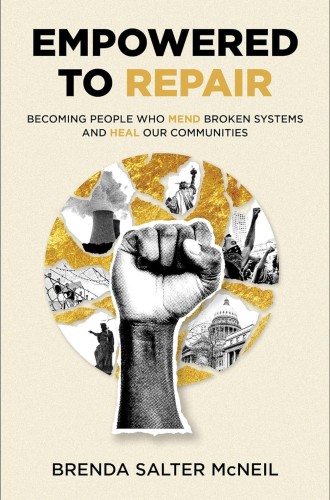Leading and lamenting with Nehemiah
Brenda Salter McNeil draws on her community organizing experience to find fresh lessons from the biblical rebuilder.

Empowered to Repair
Becoming People Who Mend Broken Systems and Heal Our Communities
Listening to experienced leaders in the movement for justice is how we grow. People who have been in the struggle for a while have seen the kinds of problems we’re facing and, by God’s grace, have persevered. In her new book, Brenda Salter McNeil welcomes us into her wisdom and shares her lessons from a career in reconciliation work. She aims to train and encourage a new generation of leaders by working through the book of Nehemiah, tracing how that ancient leader worked to rebuild Jerusalem in the face of internal conflict, external resistance, and personal burnout.
Most of the lessons that McNeil draws from the text are fairly standard, such as the importance of locating yourself near the problem, organizing people based on their self-interest, and dealing with opposition both inside and outside the community. Nehemiah has been used for hundreds of years as a leadership text; Charles Spurgeon even named his monthly magazine The Sword and the Trowel after an episode recounted in Nehemiah 4. Still, McNeil brings to the text compelling wisdom earned from deep experience.
Read our latest issue or browse back issues.
For example, when she writes about Nehemiah identifying with the plight of the Jewish people rather than merely resting within his privilege as cupbearer for the king, she draws on the rich Black church tradition of lament. From the church’s origins within the crucible of enslavement to the spirituals that fed its soul, lament has been used to “connect people through communal compassion,” which McNeil sees as necessary to the work of reconciliation. Lament is a spiritual act of hope: crying out to a God who sees our tears and will answer our cries.
Drawing from her community organizing training and experience, McNeil explores how Nehemiah’s rhetorical tactics in 2:17–18 mirror the classic organizing principle of telling a communal story that people can be invested in, the “story of us.” Without this story, people do not feel their own power to act and are atomized, with each one looking out for their own good rather than the common good. In contrast, when we are mobilized together around a shared story, we can do the work of reconciliation—just as the Jewish survivors were moved by Nehemiah’s speech to work together to rebuild Jerusalem’s wall.
One particularly interesting lesson that McNeil draws from Nehemiah is the importance of rest for leaders in reconciliation work. She highlights Nehemiah’s return to Persia from Jerusalem after 12 years of serving as a governor (13:6–7). This gives her the chance to reflect on the importance of listening to your body, setting boundaries, and observing regular rhythms of self-care. She cites her own experiences and the wisdom of activists before her, building a compelling case for future leaders. Without patterns of work and rest, it isn’t possible to have the kind of longevity in the work which McNeil herself shows. Burnout serves neither God nor the mission.
One element of Nehemiah which I wish McNeil spent more time discussing is its difficult ending. After leaving for the period of rest that McNeil praises, Nehemiah returns to Jerusalem and finds the people straying from God, neglecting the sabbath, and failing to support the Levites. The book closes with a fiery prayer and violent action by Nehemiah to purify the land and restore virtue. It’s hard to imagine how this ending fits within what we usually think of as reconciliation. McNeil glosses this as a reminder that the work of reconciliation is never done and is ultimately in God’s hands. This reading sidesteps possible critiques of Nehemiah’s actions which, frankly, I was excited for her to engage with.
I suspect McNeil doesn’t broach these topics since, as she notes in the book’s preface, she is approaching the text from a specifically Black perspective. She mentions that one of her White colleagues questioned her use of Nehemiah from a postcolonialist perspective, presumably because of concerns around the ending of the book and the ethnic exclusivism that permeates the text. But the model for McNeil’s approach to Nehemiah is recovering from the destruction of Tulsa’s Black Wall Street, not imposing the violence of colonialism. This approach fits the text’s original context, since it was written from the perspective of a subjugated nation rather than a conquering power. For White leaders, some additional interpretive work may be necessary to adequately apply Nehemiah to our own context.
Empowered to Repair is full of love for the next generation. McNeil wants to empower new leaders to act boldly since the work ahead is massive. Although she doesn’t blaze new trails in interpretation of Nehemiah, the stories and wisdom she shares provide valuable lessons as we attempt to build the kingdom of God.





